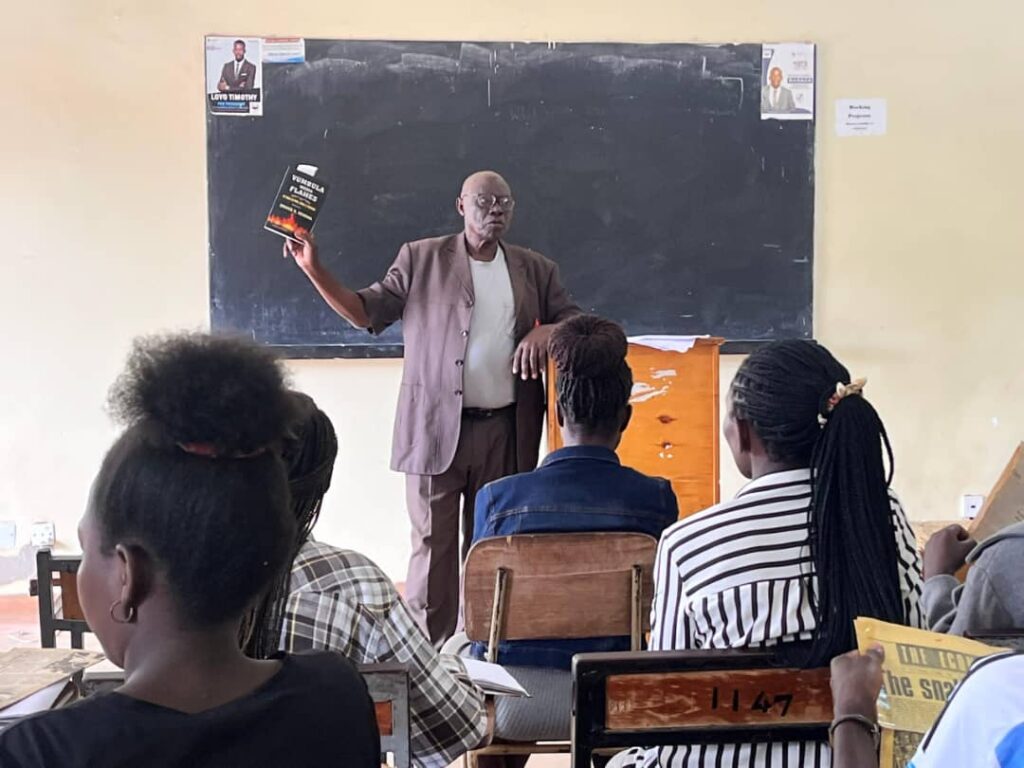By Justine Kaanyi Elizabeth
Uganda Christian University (UCU) students pursuing a Bachelor of Arts in Journalism and Mass Communication (BAJMC) were treated in journalism by the renowned veteran journalist, Drake Sekeba, during an engaging session held at the university’s M1 Block. The session, attended by first-year, first-semester students, was filled with practical advice and rich anecdotes drawn from Sekeba’s extensive career in the media industry.
Sekeba, known for his decades-long contribution to Ugandan journalism, emphasised the importance of essential qualities for budding journalists. He urged students to cultivate passion, tolerance, calmness, and a habit of reading widely. “A journalist must be dependable, reliable, and trustworthy,” he noted, stressing the need for cultural sensitivity in reporting. He also issued a stern warning against the unethical practice of accepting “brown envelopes”—a euphemism for bribes given to journalists to influence their coverage. “Be happy always,” he advised, underscoring the need for impartiality and positivity in the profession.
Reflecting on the evolution of journalism in Uganda, Sekeba shared memories from his early days in the industry. His career began with the “Sekanyolya” newspaper in 1965, and he later joined “The People” newspaper, where he worked as a sub-editor under the late Ateker Ejalu, a former minister in President Museveni’s government. Sekeba recounted working alongside prominent figures like Illakut Ben Bella, the founding head of UCU’s journalism program, the former Prime Minister Ruhakana Rugunda, and the late Governor of the Bank of Uganda, Tumusiime Mutebile, who contributed to the newspaper.
Sekeba’s training journey took him beyond Uganda’s borders, starting with early training at Nyegezi, Tanzania, one of East Africa’s premier journalism schools, followed by a press course at Cambridge University in 1984. In the turbulent years following Idi Amin’s regime, Sekeba was part of a group of pioneering journalists who founded “The Star” and “Ngabo” newspapers. These publications courageously reported the truth during a time when press freedom was under severe threat.
His illustrious career reached new heights in the late 1990s and early 2000s when he became a household name through his investigative TV program “Vumbula” on WBS TV. The program was dedicated to exposing injustices faced by the underprivileged in society, further cementing his reputation as a fearless journalist.
To make the session more memorable, Sekeba brought along old prints of the various newspapers he had worked on since the 1960s. The students were captivated by his personal stories and the tangible pieces of history, gaining a deeper appreciation for the legacy of journalism in Uganda.
Over the years, Sekeba’s contributions to the media industry have been recognized with numerous accolades, including the “TV Legend” and “Male Face of TV” awards. His dedication to mentoring the next generation of journalists was evident as he encouraged the young aspiring reporters to pursue their dreams with integrity and resilience.
“Journalism is more than just a career; it’s a calling,” Sekeba concluded, leaving the students inspired to carry the torch of responsible journalism in Uganda.


